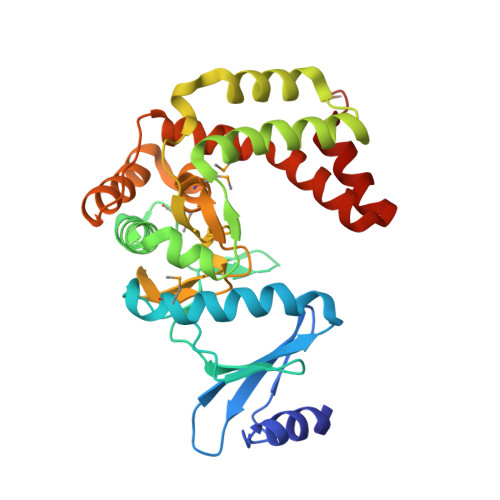The evolution of substrate discrimination in macrolide antibiotic resistance enzymes.
Pawlowski, A.C., Stogios, P.J., Koteva, K., Skarina, T., Evdokimova, E., Savchenko, A., Wright, G.D.(2018) Nat Commun 9: 112-112
- PubMed: 29317655
- DOI: https://doi.org/10.1038/s41467-017-02680-0
- Primary Citation of Related Structures:
5UXA, 5UXB, 5UXC, 5UXD - PubMed Abstract:
The production of antibiotics by microbes in the environment and their use in medicine and agriculture select for existing and emerging resistance. To address this inevitability, prudent development of antibiotic drugs requires careful consideration of resistance evolution. Here, we identify the molecular basis for expanded substrate specificity in MphI, a macrolide kinase (Mph) that does not confer resistance to erythromycin, in contrast to other known Mphs. Using a combination of phylogenetics, drug-resistance phenotypes, and in vitro enzyme assays, we find that MphI and MphK phosphorylate erythromycin poorly resulting in an antibiotic-sensitive phenotype. Using likelihood reconstruction of ancestral sequences and site-saturation combinatorial mutagenesis, supported by Mph crystal structures, we determine that two non-obvious mutations in combination expand the substrate range. This approach should be applicable for studying the functional evolution of any antibiotic resistance enzyme and for evaluating the evolvability of resistance enzymes to new generations of antibiotic scaffolds.
- Michael G. DeGroote Institute for Infectious Disease Research and the Department of Biochemistry and Biomedical Sciences, McMaster University, Hamilton, L8S 4L8, ON, Canada.
Organizational Affiliation:


















